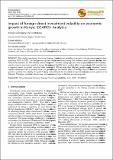| dc.date.accessioned | 2020-12-10T07:49:44Z | |
| dc.date.available | 2020-12-10T07:49:44Z | |
| dc.date.issued | 2014 | |
| dc.identifier.uri | http://repository.kippra.or.ke/handle/123456789/2366 | |
| dc.description.abstract | This study investigated the impact foreign direct investment volatility on growth in Kenya using time series data spanning 1970 to 2011. An endogenous growth model was estimated using the ordinary least squares to determine the
relationship between the FDI volatility and economic growth. Bounds testing approach was employed to show that FDI volatility retards long-run economic growth in Kenya. Results suggest that FDI has a positive effect on growth whereas FDI volatility has a negative impact on growth. Notably, trade openness is not FDI inducing, thus affecting growth negatively. However, human capital endowment has a positive impact on growth. Although the overall effect of Foreign Direct Investment on economic growth is positive the volatility of capital flows may make it harder for the stable and predictable macroeconomic policies to be followed. Therefore, unstable inflows may dampen investment, hence affecting economic growth. | en |
| dc.language.iso | en | en |
| dc.publisher | Science Publishing Group | en |
| dc.relation.ispartofseries | Journal Article; 2014 | |
| dc.subject | Gross Domestic Product | en |
| dc.subject | Foreign Direct Investment | en |
| dc.subject | Human Capital | en |
| dc.subject | Economic Growth | en |
| dc.subject | Capital Flows | en |
| dc.title | Impact of Foreign Direct Investment Volatility on Economic Growth on Kenya: EGARCH Analysis | en |
| dc.type | Journal Article | en |
| ppr.contributor.author | Kirwa, Lelei Ngeny & Mutuku Cyrus | |

